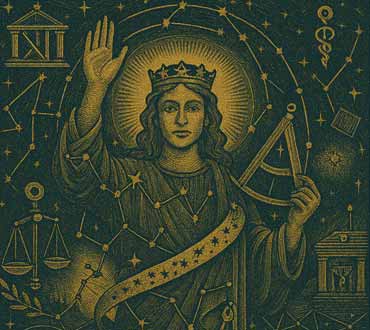The stars, for a really long time, have made the sentences for us. A chart was a contract, a season was the
verdict, and a birth hour was the lifelong assignment. We answer: the sky is a library of stories, not a court
of law. Constellations do not confer jurisdiction. Fate is no one’s concern but an individual’s choice related
to it and its chosen geometry, not otherwise.
Believe or do not believe, that’s your problem. Astrology is a reflection of thought, a mirror of the mood,
a ritual of meaning, but it does not license the rule. No authority will inquire about your ascendant. No
school will grade your Mars. No clinic, bank, or employer may sort a life by ephemeris. If a decision affects
the body, home, wage, or vote, it must rest on reasons that strangers can check, not on symbols that only
insiders can admire.
Wonder is welcome; coercion is not. Read the night, keep a journal, cast charts with friends, argue kindly
about archetypes. Call it art and treat it as art—owned by its makers, bounded by consent, and
accountable for claims. When astrology speaks as metaphor, it belongs in the studio, the diary, and the
dinner table. When it pretends to be medicine or risk, it owes evidence and will be refused if it has none.
Privacy extends to the hour of birth, by which the time and place of birth would not be tokens available
for the public’s harvest to describe someone’s profile or sale as “insight.” No app can demand it as ransom
for a simple service. No family shall use it in holding power over someone. What you share, you share on
purpose; what you keep, you keep without apology.
Fraud hides in borrowed robes. The selling of comfort is honest; the selling of cures without their proof is
not so. Entertainment labels must be attached to forecasts unless they stand on demonstrable study;
testimonies are not trials; correctness is not a vibe. If money changes hands, the terms must be plain:
what is promised, what is not, and how to walk away.
Institutions must distinguish ritual from rule. Courts do law, not horoscopes. Budgets do trade-offs, not
transits. Public health orders name thresholds, not houses. The more consequential the choice, the more
secular the footing it requires.
Symbols may guide a life freely chosen; they may not push strangers through doors they did not open.
Astrology at its best becomes a craft of listening: it gives people a grammar for defining their weather, a
stage for the articulation of intent. Let it be there-opt-in, amateur or professional, proudly symbolic,
humble about prediction, generous about error.
Clients become subjects instead of marks; codes of ethics published; I do not know are said often and out
loud. Our tactics match our ends. We will keep belief private, consent explicit, and claims labeled. We will
teach how to tell therapy from theatre, evidence from ornament. We will decline any gate that tries to
sort citizens by star, and we will expose any scheme that launders exploitation as “mystical necessity.” We
will defend your right to read the heavens and your neighbor’s right to ignore them.
It is not a prohibition on wonder; it is a boundary for power. It is very easy, actually: fewer lives constrained
by superstition, more evenings reclaimed for awe; institutions that argue in reasons, people who find
meaning without demanding obedience. Our signature is consent; our seal is daylight; our receipt is a sky
that inspires without commanding-and a society that knows the difference.








